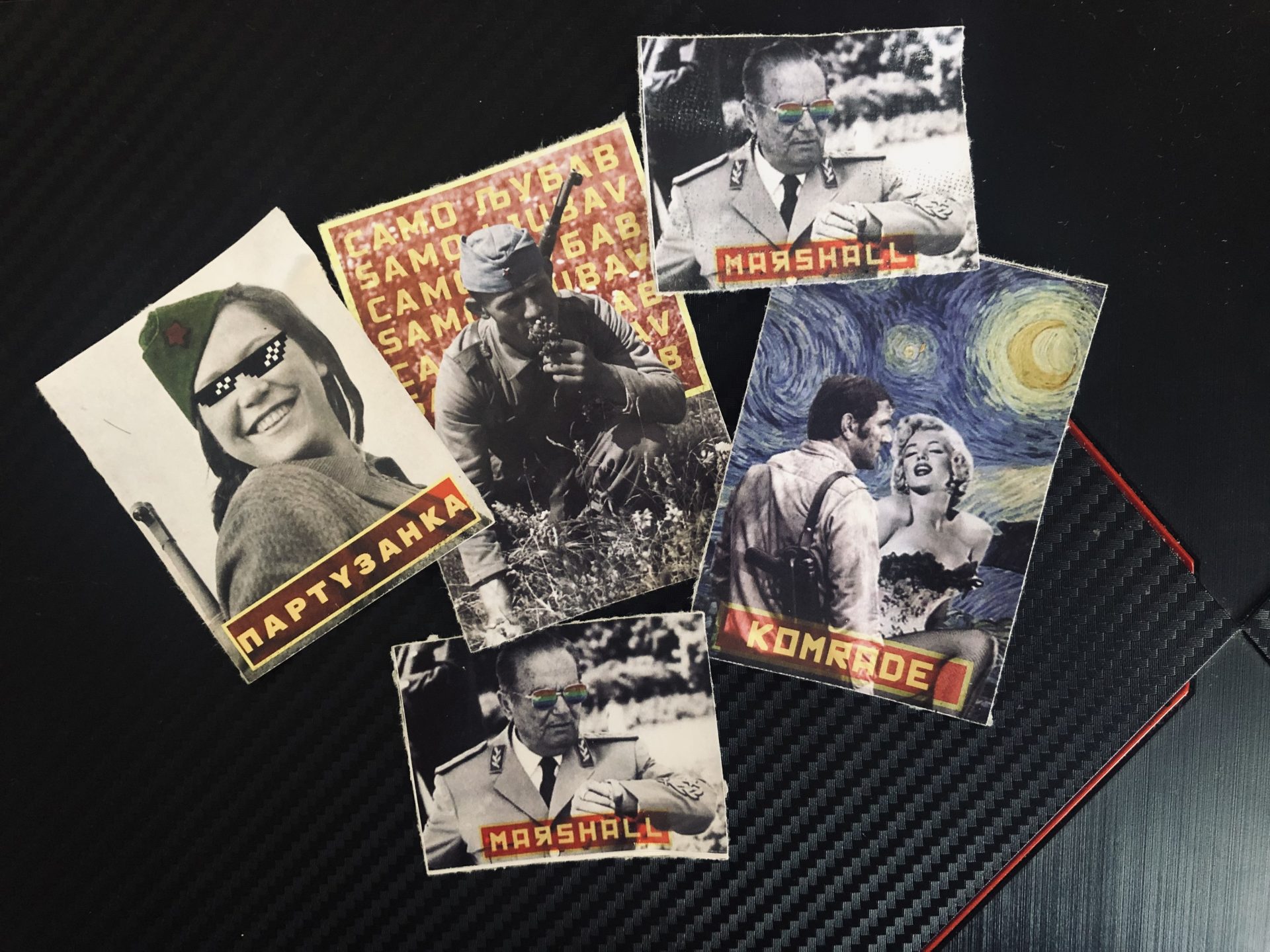
76 years after the struggle between Yugoslav partisans and Nazi Germany, new generations in Bosnia and Herzegovina (BiH) are reinventing the concepts of fascism and antifascism in light of contemporary issues.
Antifascism is usually defined as what it is not, or rather, in terms of the ideology it has tried to fight. Appearing first in Italy in the mid-1920s, strong opponents to the regime instituted by Benito Mussolini coined it to express their disagreement with an ideology soaked in nationalism, discrimination, hierarchy, militarism, and authoritarianism – the ideology whose violent and anti-egalitarian nature would cause the worst conflict of the 20th century.
As Nazi racial theories and fascist ideologies spread throughout Europe, they influenced the Croatian Ustashas and Serbian Chetnik ideologies in the Kingdom of Yugoslavia. This resulted in systematic and extensive cooperation with the Nazis in their terror campaigns in Yugoslavia and exacerbated ethnic divisions and antagonisms. In Yugoslavia, the antifascist struggle was purported by the Communist Party of Yugoslavia (KPJ), led by Josip Broz Tito, mainly against Chetniks, Ustashas, Nazis, and other fascists. It gave birth to the armed resistance movement composed of the well-known Yugoslav partisans.
Thus, in a way, fascist ideologies have allowed antifascism to exist in the first place. In highly militarized societies, sides are defined by the war, life means survival, and the fight for the right to have rights. In these contexts, recognizing the manifestation of fascism and antifascism is easier and more straightforward.
Today things have changed. How can we truly recognize manifestations of fascism and antifascism in societies that are free from direct physical conflict, where the definition of the “other side” is becoming progressively blurrier and more sophisticated to grasp?
Now in BiH new generations of activists are engaged in fighting different forms of fascism and renew antifascism accordingly. They are working to reinvent concepts that seem too intertwined with a controversial past and have lost their meanings.
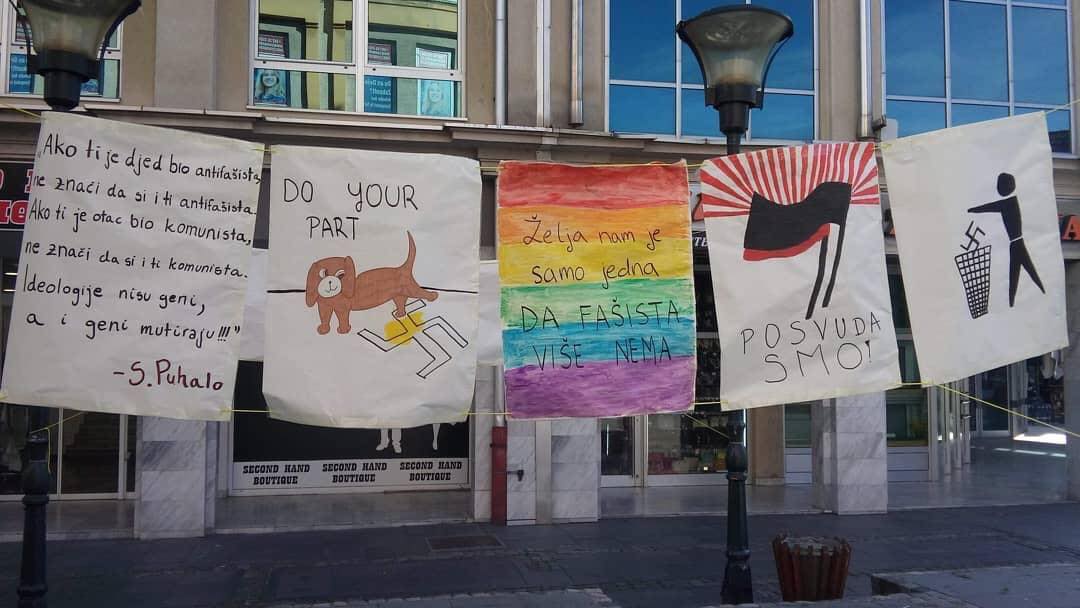
Their strategy? Understanding the values of antifascism and the worrying features of fascism in light of contemporary issues, keeping an eye on progress and social welfare. The inspiring youth that I have interviewed come from various organizations and initiatives from across BiH, including Omladinski Pokret Revolt (Tuzla), Ostra Nula (Banjaluka), Bh. Povorka ponosa (the organizing committee of the pride march of BiH), Antifa 2.0, Citizen Against Terrorism (CAT), and Partyzan Clothing.
New Manifestations of Fascism in BiH
Today fascism is manifested in BiH through nationalist and divisive narratives about the 1992-1995 war. This includes hate speech, human rights violations, and historical revisionism. The latter is defined as the reinterpretation of historically-established facts, such as the denial of the Srebrenica Genocide, the glorification of war criminals, and the spread of narratives describing Chetniks and Ustashas as antifascists rather than Nazi co-operators. As mentioned by the president of Ostra Nula, Milica Pralica, these revisionist dynamics are more worrying in Republika Srpska, where generations of kids and university students are told false narratives about their 1992-1995 past and the role of the Chetniks in the Second World War.
When asked about what fascism is today, all the interviewees surprisingly agreed with each other and had the same definition. According to them, antifascism is the stigmatization and discrimination of minority groups and the violation of their human rights just for the sake of their alleged difference. They advocate for a non-nationalized version of this perspective, believing that the focus should not be on only Serbs, Croats and Bosniaks, but also on the rights of migrants, LGBTIQ+, Romani people, people with disabilities, women, and other marginalized identities.
“We just speak about the rights of Serbs, Bosniaks and Croats and we pretend that they are the only ones deserving rights and for me this is fascism,” says Pralica.
As the executive director of Antifa 2.0, Irena Petrovic discusses how the organization was moved by worrying anti-democratic and intolerant developments in BiH, which are contributing to young people sympathizing with totalitarian, anti-democratic political solutions. The public’s reluctance towards the concept of antifascism resides in its view of communism and Tito’s regime.
“So, the problem is here: many people, especially in BiH, have very negative feelings towards communism because of its repression of freedom of religion and its neglecting of nationalities and national identities,” Petrovic explains while sipping her orange juice. She emphasizes that the only way to work with new generations that were born during or after the 1992-1995 war is to pressure institutions to foster transitional justice, something which is currently lacking.
These young activists share their experiences of waking up in the morning and being overwhelmed by fascist and nationalist symbolism, hate speech, and propaganda from all three sides, whether in the streets on stickers and t-shirts or on social media. This rhetoric includes references to Ustasha, Chetiks, and the Bosnian Army and the glorification of “great nations.”
Nationalism can easily contribute to other forms of extremism. Starting from 2012, BiH has been seen as a spot of jihadist activism and recruitment for the IS and Al-Nusra Front, which resulted in the departure of Bosnian citizens to Syria and Iraq. This also happened in 2016 when the war in Ukraine broke out. Bosnian citizens left to fight for both the Russian and Ukrainian sides.
Slobodan Blagovčanin from CAT comments on this, “we realized that our environment is very radicalized.” He continues, “we decided to found CAT in 2017, while many of our peers were leaving BiH to fight for Islamic State of Iraq and the Levant (ISIL) or to combat on the side of Ukraine or Russia…Muslims would go to battlefields in Syria and Iraq, Serbian Orthodox would join Russian forces, and Croatian Catholics would fight on the side of Ukraine. All three entities from BiH would go somewhere else to fight for someone else’s goals.”
Young artists, members of these associations, and other youth initiatives came up with the idea of reviving antifascism and freeing it from its historically negative connotation. A modern interpretation antifascism is emerging.
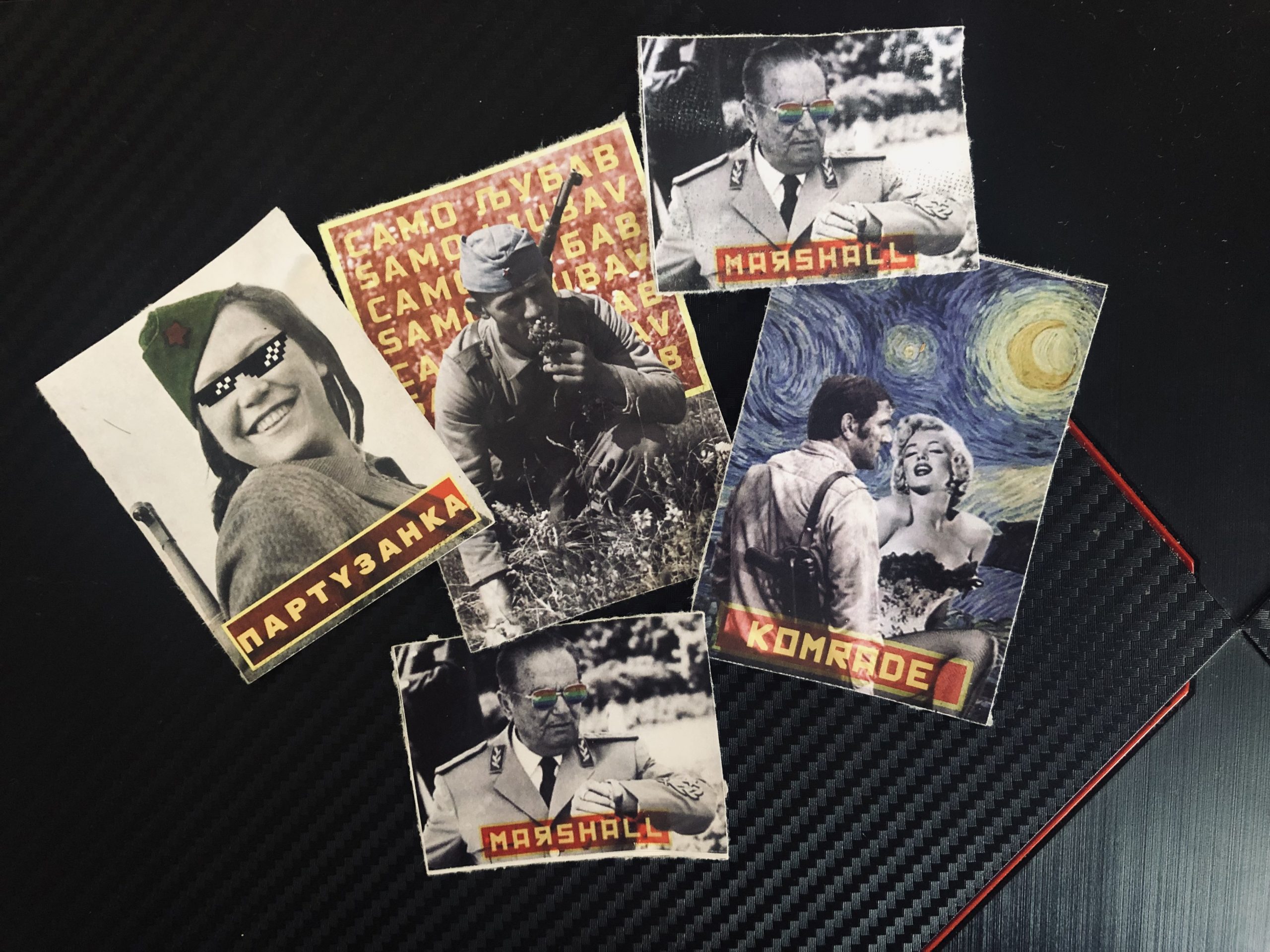
Approach to History and War Crimes
Antifa 2.0 developed an educational exhibition that, through videos, pictures, and interactive spaces, fosters the public’s understanding of the historical roots of fascism and Nazism, as well as its connection to modern forms of fascism. Antifascism is emancipated from its belligerent, communist legacy, as neither the Second World War nor the 1992-1995 war is directly tackled. In this way, existing divisions and the reluctance to discuss the topic are overcome, and the real meaning of antifascism can emerge. Furthermore, this demilitarization of antifascism conveys the idea that antifascism is not only the fight for “your own side’s rights,” but for everyone’s rights.
“New generations need to understand what antifascism means in the first place, the human values that it purports. We want to give them the tools to recognize modern forms of fascism and make them embrace its fight. We want them to understand that the values of antifascism do not exclude all other human rights,” explains Petrovic.
This strategy has proved successful.
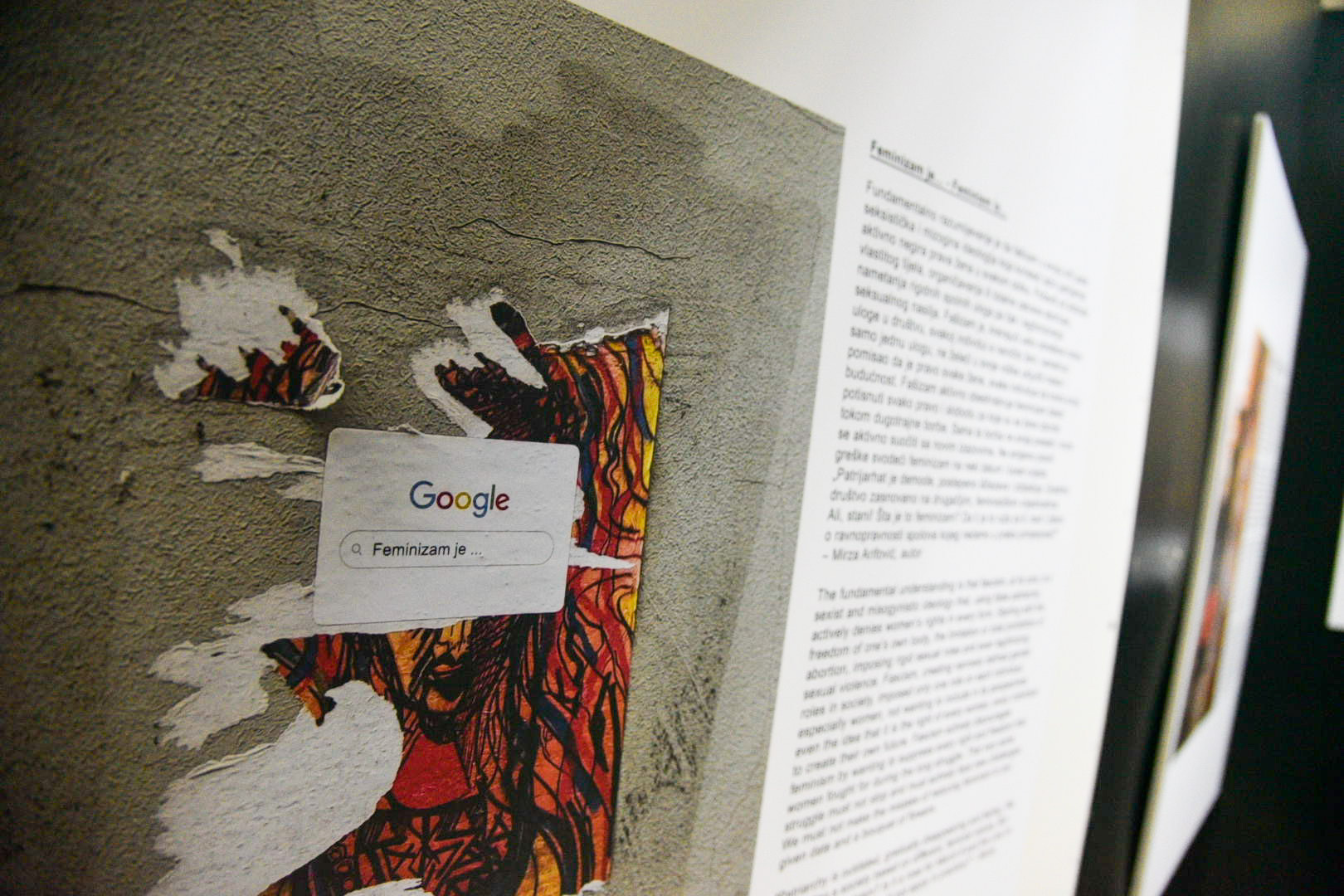
The emancipation of the concept from the wars’ legacies has allowed the team behind Antifa 2.0 to be in direct contact with the Ministries of Education of Republika Srpska and with the 10 cantons of the Federation. In this way, they succeeded in expanding their reach and acquiring a public space for the exhibition in the often-impenetrable Banja Luka, the capital of Republika Srpska. High Schoolers from Sarajevo, Mostar, Pale, Banja Luka and East Sarajevo attended the exhibition. This is a true accomplishment as history is now interpreted very differently in these cities.
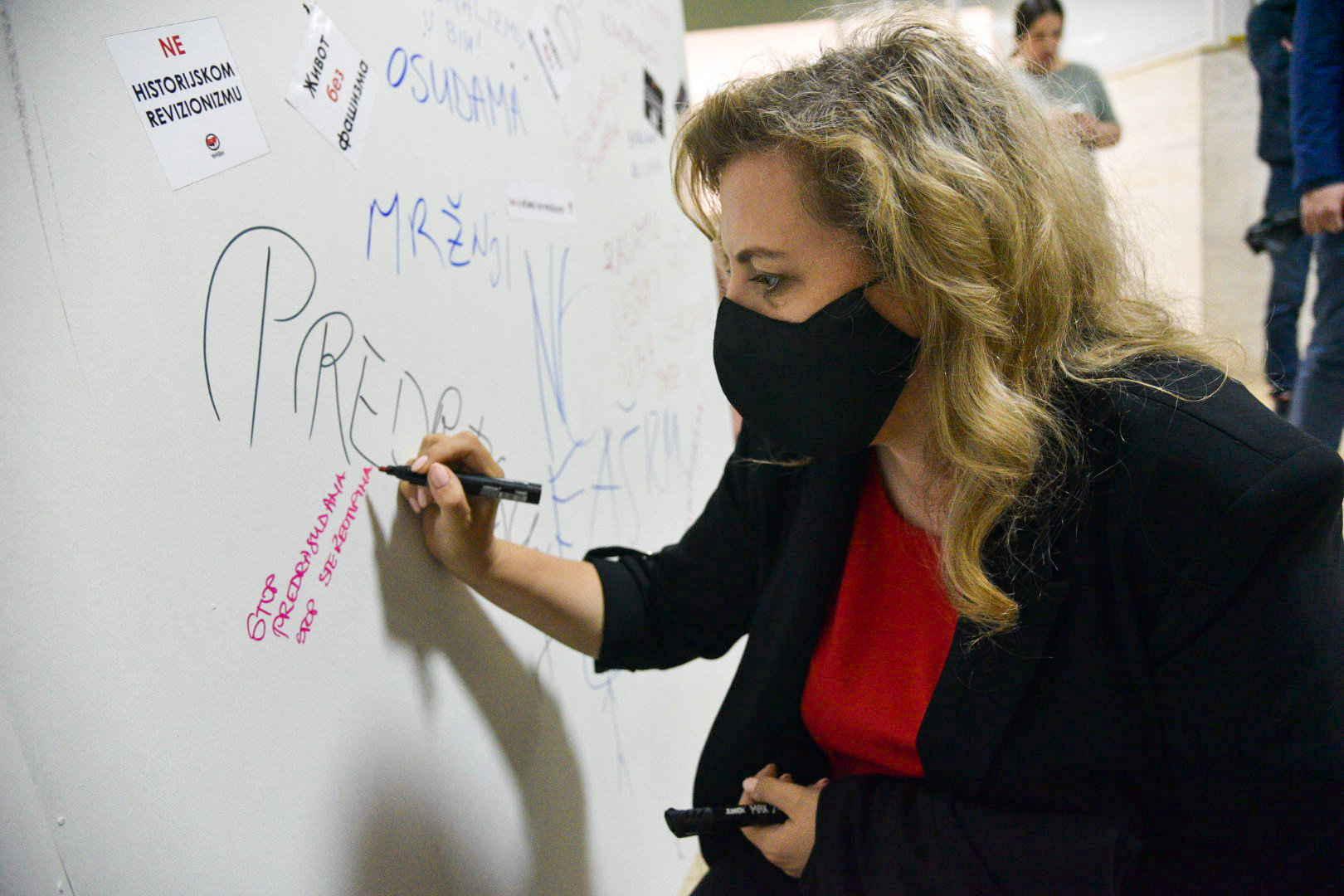
Similarly, members of CAT developed their own approach to past events that they did not experience, as they were born during or after the 1992-1995 war. Young people from Bijeljina, Brcko Distrikt, Gradačac, Tuzla, Mostar, Prijedor, Zvornik, Vitez and Zivinice came together to free a new generation from a sense of guilt related to their ethnicity. Through their 20 million reaches on social media, they act to prevent youth radicalization, to make diversity flourish, and to fight the political instrumentalization of the recent war. Their compass is the legal verdicts and the Dayton agreement.
“I don’t want a young person to feel guilty about an event that happened before he/she was born, but rather to accept that there were people who committed crimes…speaking about Srebrenica, we don’t feel like we still have to prove to anyone that genocide happened, we have the Hague tribunal for that – we are young activists who want more in BiH for us, more opportunities. I really hope that a recently passed law against genocide denial will finally stop all these rhetorics and narratives – we (the youth) cannot live our lives focusing on these past issues when facts were established,” says Blagovčanin, with a voice full of intensity and pragmatism.
The Inclusion of Queer Perspective in Antifascism
If antifascism means to revolt against all forms of oppression, discrimination, violence, and injustice, then queer people and perspectives should be included in this fight. Antifascism is one of the first values purported by the Pride March of BiH organized by BiH. Povorka Ponosa that took place in Sarajevo on the 14th of August.
“During former Yugoslavia, homosexuality was a crime, it was punishable by law, and it was important for us to emphasize that antifascism is also the guarantee of human rights for everyone, including the human rights of the LGBTIQ+,” explains Zagorac from the organizing committee.
It’s not a coincidence that in May this year the strength and originality of their perspective brought the Organizing Committee of the BiH Pride Parade together with the Youth Center KVART from Prijedor to win a grant delivered by the Peacebuilding Network. Their artistic-activist action, “Antifascism is our choice,” happened on May 9, Victory over Fascism Day and Europe Day. It consisted of street actions and online campaigns merging the anti-fascist struggle and LGBTIQ+ rights and symbols. This campaign happened simultaneously in Banja Luka, Tuzla, Zenica, Prijedor and Sarajevo.
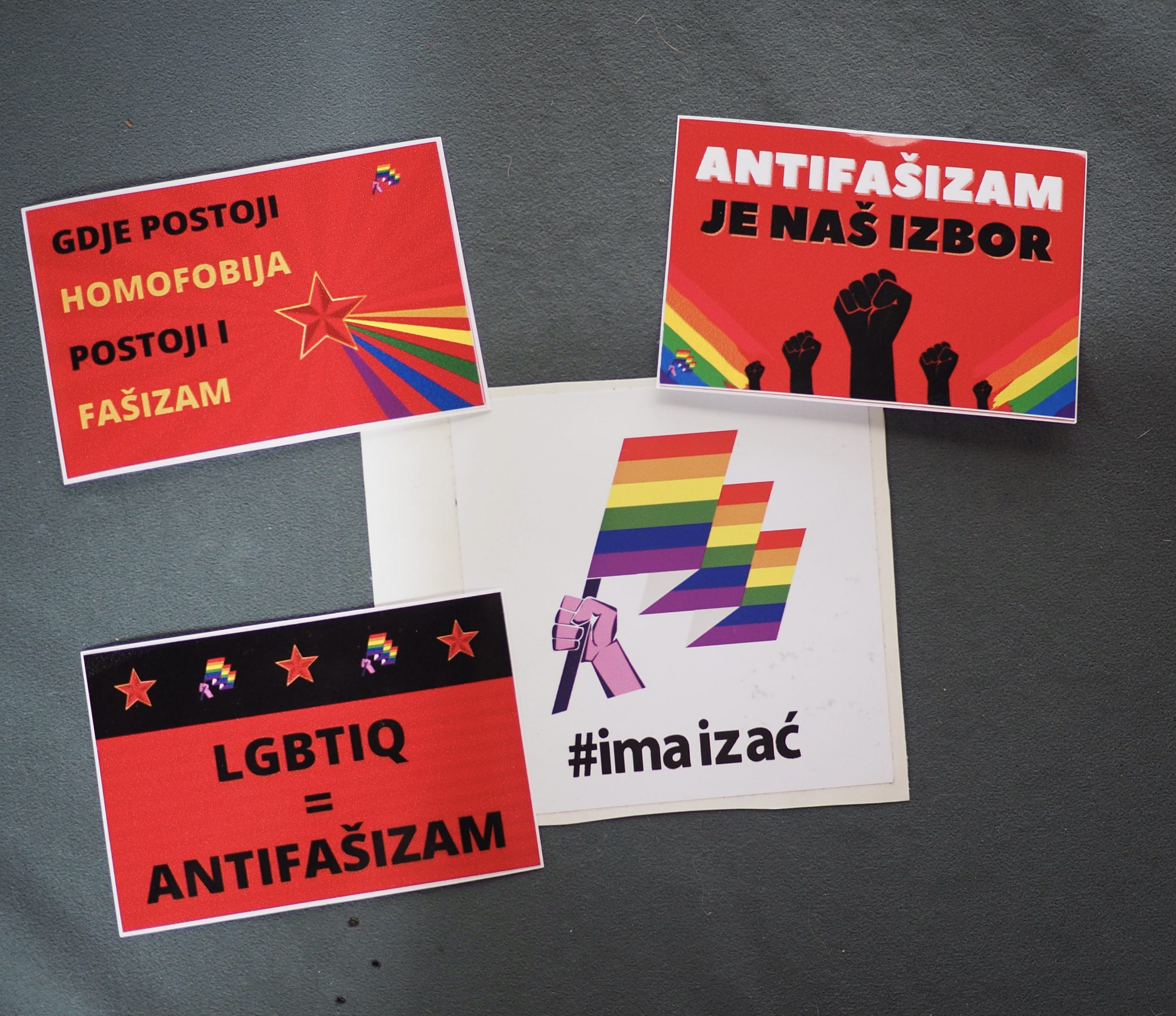
“We believe these campaigns were a success in all cities. People were happy to come to talk to us in the street and know more about the connection between LGBTIQ+ and human rights and antifascism…I want to highlight that we are activists in several fields; for us, any violation of human rights and inequality is part of the antifascist struggle. We want to empower people to comprehend new forms of fascism because the fight is not over,” Zagorac explains over her cappuccino.
New Means to Promote New Generations’ Engagement
“I believe that the environment and natural resources will be the new fight that will unite people beyond their ethnicities, as people from all over BiH and the Balkans are already fighting for their rivers and waters,” says Pralica from Ostra Nula (Banja Luka).
This helps us reflect on the way that people can come together and support each other for the sake of a collective good. However, people’s engagement can only be effective if a common sense of belonging is built. This reflection has pushed Selver Učanbarlić to found Partyzan Clothing, a brand that renews antifascist symbolism and makes people visually connected to the same values.

“I realized that nationalist and fascist propaganda used symbolism to create a feeling of community. That is why I decided to create a brand that could counter nationalism using the same visual strategy and making antifascism be fashion again! The old symbols of antifascism cannot fit our present society anymore. That is why they needed to be renewed…my designs are a mixture of pop culture (because it is popular, and people understand it) with an antifascist touch,” explains Učanbarlić with enthusiasm.
Fascism in Europe and BiH is changing forms and is harder to recognize and fight. However, new generations from all over BiH are rising to the challenge, adapting, and reviving antifascist values according to modern trends, social issues, and necessities. Past, present, and future are combined through youth initiatives. They are overcoming the public’s fear of diversity and embracing human solidarity by creating new artistic symbols, street and online campaigns, workshops, and opportunities to gather and have exchanges.
Their engagement and determination should be an inspiration for all those who believe in a better future for BiH.






